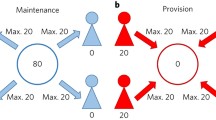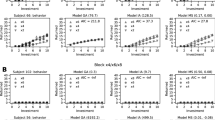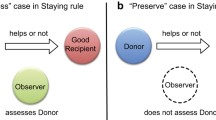Abstract
A reciprocal action is an action meant to have a similar influence on another's payoff as another's action has on one's own. One hypothesis asserts that reciprocal action is triggered by the reciprocator's belief that another's action was good or ill intended. The other hypothesis says that the reciprocator is simply acting to implement fixed preferences over payoff allocations. We report on an experiment that allows us to study both positive (reward) and negative (punishment) reciprocal action in a single framework. Knowing the preferences for payoff allocations is sufficient to account for nearly all the reciprocal action we observe in our experiment.
Similar content being viewed by others
References
Abbink, K., Irlenbusch, B., and Renner, E. (1997). “The Moonlighting Game-An Experimental Study on Reciprocity and Retribution.” SFB Discussion Paper B-415, University of Bonn.
Blount, S. (1995). “When Social Outcomes Aren't Fair: The Effect of Causal Attributions on Preferences.” Organizational Behavior and Human Decision Processes. 63, 131-144.
Bolton, G.E. (1991). “A Comparative Model of Bargaining: Theory and Evidence.” American Economic Review. 81, 1096-1136.
Bolton, G.E., Brandts, J., and Katok, E. (1996). “A Simple Test of Explanations for Contributions in Dilemma Games.” Discussion Paper 360.96, Institut d'Analisi Economica, Barcelona, Revised April 1997.
Bolton, G.E. and Ockenfels, A. (1998). “Strategy and Equity: An ERC-Analysis of the Güth-van Damme Game.” Journal of Mathematical Psychology. 42, 215-226.
Bolton, G.E. and Ockenfels, A. (1997). “ERC: A Theory of Equity, Reciprocity and Competition.” Working Paper, Penn State University, Revised May 1998.
Bolton, G.E. and Zwick, R. (1995). “Anonymity versus Punishment in Ultimatum Bargaining.” Games and Economic Behavior. 10, 95-121.
Brandts, J. and Charness, G. (1998). “Hot vs. Cold: Sequential Responses and Preference Stability in Experimental Games.” Working Paper, Institut d'Analisi Economica, Barcelona.
Camerer, C., Knez, M., and Weber, R. (1996). “Virtual Observability.” Working Paper, Cal Tech.
Charness, G. (1996). “Attribution and Reciprocity in a Simulated Labor Market: An Experimental Investigation.” Working Paper, UC Berkeley.
Eshel, I., Samuelson, L., and Shaked, A. (1998). “Altruists, Egoists, and Hooligans in a Local Interaction Model.” American Economic Review. 88, 157-179.
Fehr, E., Kirchsteiger, G., and Riedl, A. (1993). “Does Fairness Prevent Market Clearing: An Experimental Investigation.” Quarterly Journal of Economics. 108, 437-459.
Güth, W. (1995). “An Evolutionary Approach to Explaining Cooperative Behavior by Reciprocal Incentives.” International Journal of Game Theory. 24, 323-344.
Güth, W., Schmittberger, R., and Schwarze, B. (1982). “An Experimental Analysis of Ultimatum Bargaining.” Journal of Economic Behavior and Organization. 3, 367-388.
Hayashi, N., Ostrom, E., Walker, J., and Yamagishi, T. (1998). “Reciprocity, Trust, and the Illusion of Control: A Cross-Societal Study.” Working Paper, Indiana University.
Huck, S. and Oechssler, J. (forthcoming). “The Indirect Evolutionary Approach to Explaining Fair Allocations.” (Games and Economic Behavior).
Kagel, J., Kim, C., and Moser, D. (1996). “Fairness in Ultimatum Games with Asym-metric Information and Asymmetric Payoffs.” Games and Economic Behavior. 13, 100-110.
Kockesen, L., Ok, E.A., and Sethi, R. (1997). “Interdependent Preference Formation.” Working Paper, Barnard College, Columbia University.
Laury, S.K., Walker, J.M., and Williams, A.W. (1995). “Anonymity and the Voluntary Provision of Public Goods.” Journal of Economic Behavior and Organization. 27, 365-380.
McKelvey, R.D. and Palfrey, T.R. (1998). “Quantal Response Equilibria for Extensive Form Games.” Journal of Experimental Economics. 1, 9-41.
Rabin, M. (1993). “Incorporating Fairness into Game Theory and Economics.” American Economic Review. 83, 1281-1302.
Roth, A.E. (1995). “Bargaining Experiments.” In J. Kagel and A.E. Roth (eds.), Handbook of Experimental Economics. Princeton: Princeton University Press.
Schotter, A., Weigelt, K., and Wilson, C. (1994). “A Laboratory Investigation of Multiperson Rationality and Presentation Effects.” Games and Economic Behavior. 6, 445-468.
Selten, R. and Ockenfels, A. (1998). “An Experimental Solidarity Game.” Journal of Economic Behavior and Organization. 34, 517-539.
Winter, E. and Zamir, S. (1997). “An Experiment with Ultimatum Bargaining in a Changing Environment.” Working Paper #195, Washington University, School of Business and Center in Political Economy.
Author information
Authors and Affiliations
Rights and permissions
About this article
Cite this article
Bolton, G.E., Brandts, J. & Ockenfels, A. Measuring Motivations for the Reciprocal Responses Observed in a Simple Dilemma Game. Experimental Economics 1, 207–219 (1998). https://doi.org/10.1023/A:1009951108693
Issue Date:
DOI: https://doi.org/10.1023/A:1009951108693




